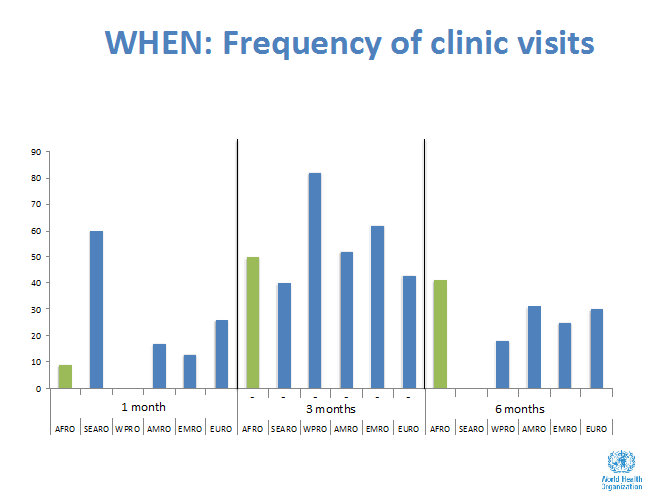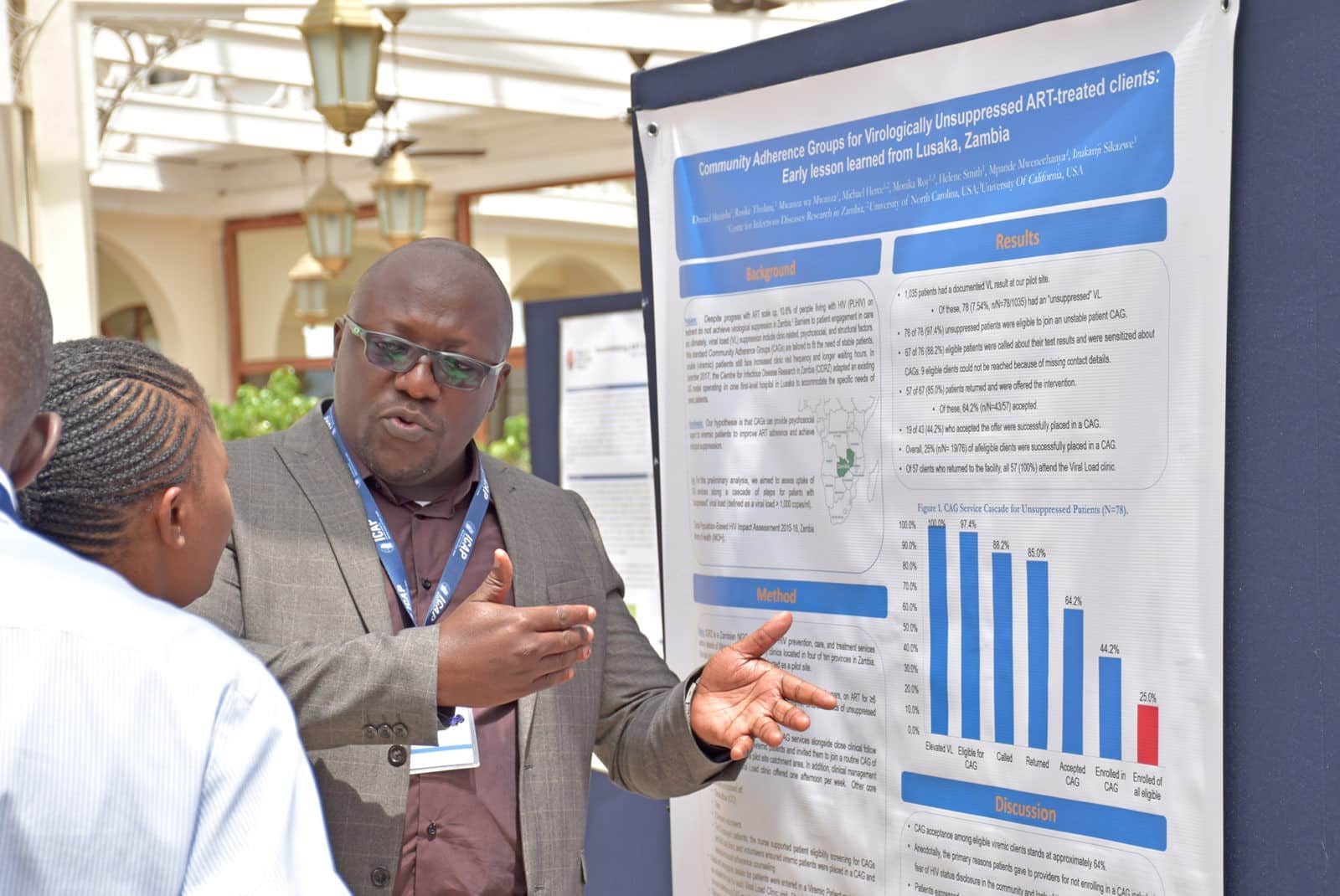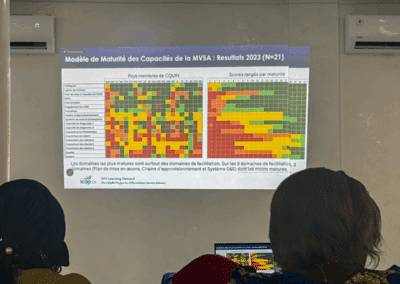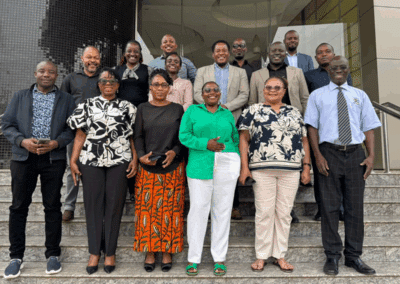Video: Partnering to Advance Differentiated Service Delivery
Maputo, Mozambique—The HIV Coverage, Quality, and Impact Network (CQUIN) held its annual meeting from February 13-15 in Maputo, Mozambique. Representatives from ministries of health in nine CQUIN countries gathered, along with implementing partners, donors, civil society, and UN agencies, to review lessons from the first year of CQUIN, and work toward the scale-up of differentiated service delivery (DSD) for HIV.
“Countries around the world are striving for HIV epidemic control,” said CQUIN Principal Investigator Miriam Rabkin, MD, MPH. “The CQUIN network fosters joint learning, and meetings like this one enable stakeholders to share their experiences and learn from one another. It’s great to see all the progress that’s been made over the past year since CQUIN was launched, and how much the network has grown.”
The three-day meeting highlighted priorities for scaling up DSD. Each day had a theme based on CQUIN’s three major focus areas: Coverage, Quality, and Impact. Presentations, panel discussions, and breakout groups explored key topics related to CQUIN’s communities of practice and country priorities, from differentiated monitoring and evaluation (M&E) to DSD for adolescents and young adults.
“The Foundation is supporting this network to improve outcomes for people living with HIV, and help countries make better use of both patient and health systems resources,” said Peter Ehrenkranz, MD, MPH, senior program officer at the Bill & Melinda Gates Foundation. “The goal is for everyone to work together and improve on their national guidelines and strategic plans. It’s our hope that these improvements will lead to changes in funding for scale-up of DSD.”
Here are some of the key takeaways:
National data point to an uptake of DSD-friendly policies, but there is still work to do
The nine CQUIN countries provided information to update their DSD Dashboards, which indicate that all countries have laid a foundation for scale-up DSD with the development of policies, guidelines, and training materials. The countries also made significant progress in implementing about two-thirds of action plan activities from the three previous CQUIN meetings.
Every year, governments provide data about their HIV programs to the World Health Organization (WHO) for its annual global “state of the epidemic” report. Nathan Ford, PhD, MPH, a scientific officer with the Department of HIV/AIDS and Global Hepatitis Programme of WHO in Geneva, gave an overview of the uptake of DSD at the policy level, with a focus on stable clients.
Dr. Ford described the uptake of policies related to the “when, where, and who” of DSD. He noted a clear shift in policies related to visit frequency, especially in Southern, Central, and Eastern Africa, where no countries require monthly clinic visits for stable clients and more than half permit twice-yearly visits. In contrast, few countries, even in these regions, dispense more than a three months’ supply of ART.

Figure 1: 2016 data on clinic visit frequency in national guidelines/policies
Turning to the “who” and “where” of DSD models, Dr. Ford noted that while a majority of countries are supporting task shifting and nurse-initiation of ART for adults, this approach is still lagging for children. Community ART is most prevalent in the AFRO region, with 53 percent of countries in East and Southern Africa reporting the availability of these models.
DSD scale-up must come from the ground up
People living with HIV must understand what DSD is and demand it for their settings in order to achieve epidemic control, argued Solange Baptiste, ScM, executive director of the International Treatment and Preparedness Coalition (ITPC), on day one of the CQUIN meeting.
ICAP and the CQUIN network are committed to partnering with civil society and people living with HIV to scale up DSD. Engaging people living with HIV is a critical element of implementing new service delivery programs, and improving care and treatment.

Members of a community ART refill group in Epworth, Zimbabwe. Ensuring communities are involved in planning of differentiated services is key to epidemic control.
Ms. Baptiste shared results from a rapid assessment conducted by ITPC and its partners, focused on patient readiness for DSD. The survey included 266 people living with HIV and health care workers from Cameroon, Ivory Coast, Kenya, Malawi, Morocco, Tanzania, and Zambia.
ITPC found that people living with HIV were supportive of DSD, stating that it would make their lives easier, allowing them to save time and money to access treatment. At the same time, they noted the potential risks of community-based ART services, including involuntary disclosure of their HIV status, resulting in stigma and discrimination, particularly for adolescents and key populations. Ms. Baptiste added that the findings reinforce the need for comprehensive training of health care workers to accompany the rollout of differentiated ART models.
One size does not fit all, and community preferences for DSD models varied across countries. Community drug-distribution points and fast-track appointments were the most popular models of care among participants.
ITPC is spearheading treatment education, focused on the importance of HIV treatment and DSD for people living with HIV, health care providers, and community members. Ms. Baptiste explained that treatment education is a critical component of community-led demand creation and advocacy, because people will not advocate or demand services they know little or nothing about. Supporting community monitoring of rollout and scale-up of DSD is equally important, said Ms. Baptiste, so we can track program progress over time.
Ms. Baptiste referred to a DSD toolkit developed by The AIDS Rights Alliance for Southern Africa (ARASA) and ITPC, with the support of the International AIDS Society (IAS). The “What Works for Me: An Activist Toolkit on DSD” helps communities understand DSD within their national context, and advocate for services.
DSD implementation is a work in progress
Representatives from The Global Fund and the U.S. Centers for Disease Control and Prevention (CDC) described the efforts they are making to support DSD implementation across countries.

Funders weigh in. Left: Dr. Ade Fakoya from The Global Fund. Right: Dr. Isaac Zulu from CDC.
CQUIN countries have reported substantial progress in foundational aspects of DSD implementation, such as development of policies and guidelines, but they have also indicated that other key areas—such as monitoring & evaluation (M&E), impact assessment, and quality improvement for DSD—are progressing more slowly as models are implemented.
Data from a 2017 survey of 722 ICAP-supported facilities across 13 countries point to a rapid scale-up of DSD ART models. Among these facilities, 50 percent are currently offering at least one DSD model. Of these, half began offering DSD within the past six months, and an additional 25 percent of facilities are planning to offer DSD for ART within six months.
2018 is the year of scale-up
If one theme resounded throughout the meeting, it’s that 2018 is the year of DSD scale-up. Most CQUIN countries have laid the groundwork for DSD implementation, introducing policies and guidelines supportive of DSD and working to move beyond pilot programs to implementation at scale.






